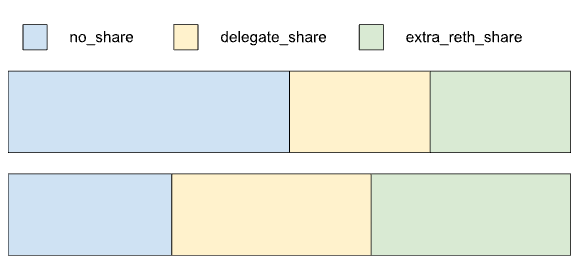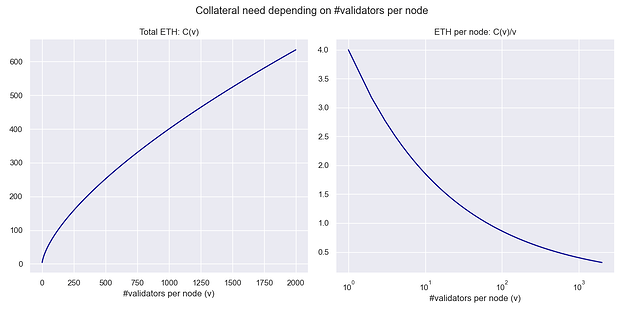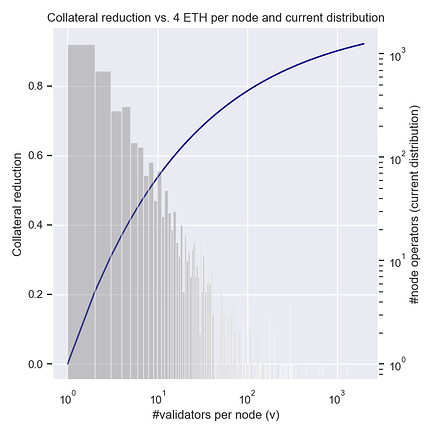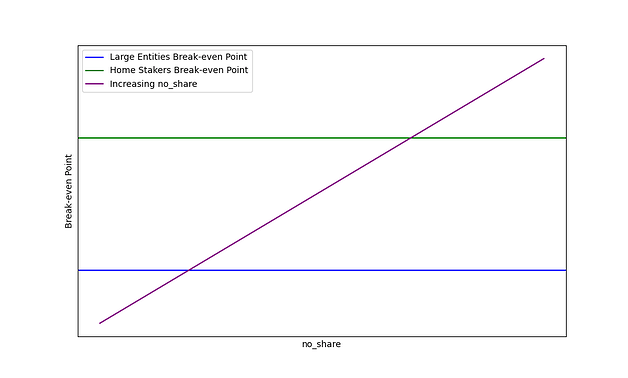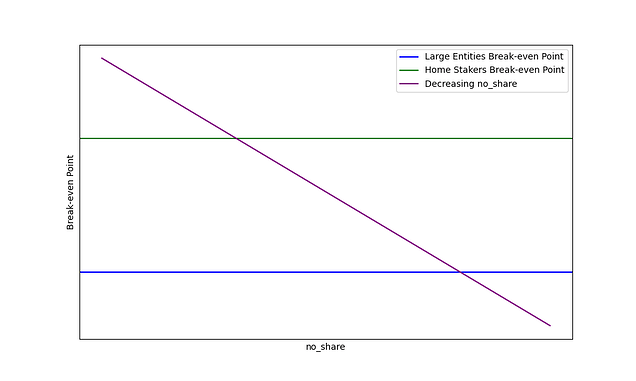Based on feedback received on the previous proposal, we present an updated version for the community’s consideration.
After much discussion with the authors of the rework proposal, it is clear that there are some incompatible differences between our proposals. We therefore present this as an alternative to the rework, and believe our proposal will lead to better outcomes for the entire Rocket Pool community.
The fundamental difference between our proposals is in maintaining the essential RPL collateral requirement, which is critical for protecting Rocket Pool’s decentralized validator set. The rework proposal’s abandonment of this requirement, and lack of alternative safeguards, exposes the protocol to the risk of centralized takeover.
Additionally, removing the collateral requirement, which has historically been the primary value driver for RPL, exposes the token to significant price risk. Without RPL collateral, the demand for RPL is likely to decrease sharply. We expect significant reductions in staked RPL should the rework proposal be adopted, leading to increased supply on the market and exacerbating the downward pressure on price.
A lower price for RPL diminishes the protocol’s economic security, making it cheaper for malicious actors to acquire a controlling stake in the token. This increased affordability heightens the risk of governance attacks, as attackers can more easily accumulate enough tokens to influence or override protocol decisions. Consequently, the removal of the collateral requirement not only threatens the stability and value of RPL but also risks compromising the security and integrity of the entire governance system.
We are not the only ones to reach this conclusion. NodeSet, in their review of the tokenomics rework, also flagged the “extreme centralization risk” inherent to this approach. Despite receiving the same feedback from multiple parties the authors are nonetheless pushing forward with this risky and economically-flawed proposal.
Instead of abandoning the RPL collateral requirement and the protection it provides, our proposal transforms it into a strategic asset, leveraging it to drive protocol growth while enabling RPL holders to earn yield on their RPL. This approach not only safeguards decentralization but also fuels expansion and rewards for the community.
Introduction
Our proposal’s overarching aim is to position Rocket Pool as the premier choice in the Liquid Staking Token (LST) space, appealing to both Node Operators (NOs) and rETH holders. To achieve this, our strategy focuses on five critical pillars:
- Unlock TVL Growth by Enabling Efficient Scaling for NOs: Our approach removes the burdensome RPL exposure requirement, empowering NOs to scale their operations more efficiently. By decoupling NO performance from RPL price volatility, we create a more stable and attractive environment for potential operators.
- Harness Competition to Optimize rETH’s APY: We leverage market competition among NOs to enhance rETH’s APY.
- Introduce Scalable Bond Curves: Our proposal includes more scalable sublinear bond curves, enabling NOs to deploy more ETH from the pool. This innovation increases capital efficiency, allowing Rocket Pool to handle greater volumes and drive further growth.
- Enhance Decentralization Protections: We introduce robust mechanisms to safeguard against centralization, ensuring the protocol remains decentralized and resilient. These protections are crucial for maintaining the integrity and trustworthiness of Rocket Pool.
- Allow RPL holders and pDAO to earn RPL yield: We give RPL holders and pDAO the opportunity to earn yield on their RPL, providing additional rewards to the community and ongoing protocol revenue to pDAO.
To achieve these objectives, we propose the implementation of a delegated staking system. This system empowers RPL holders to delegate their RPL to NOs, earning a share of validator commissions in return. This in turn allows NOs to scale up without any direct RPL exposure.
Components
Delegated Staking
One major factor that has constrained Rocket Pool’s growth is the requirement for a single entity to provide ETH, RPL, and possess the technical ability to operate Ethereum validators. While one solution might be to abandon the collateral requirement entirely, this approach leaves the protocol vulnerable to centralized takeover, which is not a viable option.
A more effective strategy is to separate these roles, allowing one party to provide the ETH and another to provide the RPL. The protocol has already taken initial steps in this direction with the introduction of whale marriages. However, whale marriages are inherently flawed because they are only accessible to large ETH and RPL holders, making them a centralizing force within the protocol.
Delegated staking rectifies this issue by enabling any RPL holder—large or small—to participate in delegation and earn a share of validator rewards in exchange for providing the NO’s collateral. By democratizing whale marriages, we allow the entire Rocket Pool ecosystem to participate, rather than limiting involvement to large ETH/RPL holders.
Commission Structure
Similar to UARS, our proposal divides the validator commission (i.e. the rewards that do not go directly to rETH) into several shares:
| Share name | Description |
|---|---|
| no_share | Paid to NO in ETH |
| delegate_share | Paid to NO’s delegates in RPL (bought with delegate_share ETH) |
| extra_reth_share | Paid to rETH in ETH |
| recollateralization_share | Used to purchase protocol-owned RPL when NO is undercollateralized |
The max_commission_rate parameter is set by the pDAO, controlling the maximum commission that NOs can charge and setting an upper limit on commissions at the protocol level. The current commission rate of 14% is higher than Lido but the full deposit pool demonstrates high demand at this price point. We propose leaving the max_commission_rate at 14% and reducing as necessary according to demand.
Each NO sets their own no_share when establishing their node, which must be lower than the max_commission_rate.
The remaining value - calculated as the difference between max_commission_rate and no_share - is strategically allocated between delegate_share and extra_reth_share, optimizing incentives for both NOs and delegates while enhancing rETH’s APY.
Illustrative examples of the distribution:
To attract delegation, NOs will need to increase their delegate_share. The only way to do this is by reducing their no_share, which also increases the extra_reth_share, thus enhancing rETH’s APY. This system incentivizes NOs to boost their validator rewards and delegates to increase their delegation rewards.
Our proposal harnesses market forces and the rational self-interest of participants, creating a self-reinforcing cycle of growth and increased rETH APY. This market-driven approach ensures sustainable and organic expansion of the Rocket Pool ecosystem.
If a NO is undercollateralized - more on this in the next section - a portion of their rewards (recollateralization_share) is used to purchase protocol-owned RPL on behalf of pDAO, bringing them back to the minimum collateralization ratio automatically.
Collateralisation
We propose retaining the 10% of borrowed ETH collateral ratio, with modifications that simplify its maintenance for NOs. The collateral requirement provides numerous benefits to the protocol. Rather than abandoning it, we have designed our system to transform this requirement into an asset rather than a liability.
To create new validators, a NO must be at or above the min_collateral_ratio. A NO who falls below this ratio will need to attract delegation or purchase their own RPL to create more validators.
Fluctuations in RPL price can temporarily push a NO over the max_collateral_ratio. In this scenario, the NO cannot receive additional delegated RPL but can launch more validators if they have sufficient ETH. Launching new validators will reduce their collateralization ratio, bringing it below the maximum and allowing them to receive additional RPL delegation. This ensures the system never becomes deadlocked.
| Can add validators | Can receive delegation | |
|---|---|---|
| Under min collateral | ||
| In between min and max | ||
| Over max collateral |
To further simplify the process for NOs, new NOs will not be required to provide collateral in advance for their first n validators. They can launch their validators without staked or delegated RPL, and their node will be collateralized with pDAO-owned RPL. This approach makes RPL collateral entirely invisible for new NOs, balancing the simplicity of onboarding with the necessary protection against centralization. The collateral requirement only becomes visible for larger NOs.
While some NOs might attempt to use sock puppets and run multiple nodes to exploit the collateral-free validators, this strategy would prevent them from benefiting from the increased yield provided for lower ETH bonds. The economically rational decision would be to run as many validators as possible in a single megapool and attract delegation to reach the required collateral amount.
Protocol-owned RPL
If a NO is below the min_collateral_ratio and has not attracted sufficient RPL delegation (or purchased their own RPL), the protocol will act as the “delegate of last resort.” In this scenario, a share of the NO’s commission - the recollateralization_share - is used to purchase RPL on behalf of the pDAO, which is then automatically delegated to the NO. The automatic purchases continue until the NO has reached the minimum delegation. This guarantees that as long as the NO continues earning rewards, they will eventually reach the minimum collateralization level even if they cannot attract delegation.
The RPL owned by the pDAO provides additional RPL yield to the protocol, potentially allowing RPL inflation to be reduced to zero in the future. This also gives the pDAO new tools to incentivize the type of decentralized NOs the protocol wishes to attract. Protocol-aligned NOs can be made more profitable than centralized entities, counterbalancing the economies of scale enjoyed by larger operators.
For example, the pDAO can delegate to protocol-aligned operators (e.g., home stakers) at a lower delegate_share than the prevailing market rate non-aligned NOs are required to offer. This increases the profitability for that NO, giving home stakers a level playing field against centralized operators.
While not a part of our current proposal, this lays the foundation for a future “community RPL pool” which automatically manages delegation to NOs and acts as a “delegate rewards smoothing pool”.
Sublinear Bond Curves
To accelerate protocol growth, we propose building upon the foundation laid in the Megapools and Bond Curve RPIPs. Our research, summarized below, shows there is further room to safely enhance capital efficiency through the use of sublinear bond curves. This optimization allows NOs to deploy more ETH from the pool, driving greater protocol growth.
We propose that depending on the total number of validators for a given node operator v, the total collateral requirement in ETH C(v) is given by: C(v) = C(1)*v^p
For example, using C(1)=4 ETH and p=⅔:
Currently, about 35% of nodes run one validator, so there would be no change unless they added more validators. However, for 20% of node operators who operate 80% of the validators, the reduction is 50% and potentially more:
The Left axis/blue line shows the ratio of proposed collateral needed per operator (operating v validators on the x-axis) divided by the current collateral needed when assuming 4ETH per validator. The right axis/gray bars show the current distribution, e.g. about 1200 operators running one validator. The conclusion is that compared to the world of vanilla LEB4, relatively less collateral is needed as the number of validators per node increases.
For efficiency and improved user experience we propose providing a list of bond amounts at rounded values, as opposed to implementing the curve in Solidity and allowing NOs to choose any point on the curve.
We recommend introducing a cap on the total amount of ETH a node operator can borrow to limit protocol risk.
Deposit Queue
We anticipate that our proposed changes will lead to significant growth in validator count. Therefore, it is crucial to address how we handle both full and empty deposit pool scenarios.
Previously, the protocol increased the commission rate for a NO when the deposit pool was full. However, this system had a fundamental flaw: the increased commission applied for the lifetime of the validator, leading to two major issues. First, NOs were incentivized to wait for higher commissions before launching validators. Second, the extra commission was taken from rETH’s APY, effectively reducing returns for rETH holders.
Our approach retains the benefits of incentivizing NOs to add validators while eliminating the drawbacks. To motivate NOs to add validators, the pDAO will delegate RPL to potential new NOs. The pDAO can offer to delegate at gradually reduced commission rates until the first NO accepts the offer, effectively providing a subsidy without the need for further coordination. This method ensures that NOs receive the necessary incentives to add validators quickly and efficiently, maintaining the overall effectiveness of the system.
This new system offers two significant improvements over the old one:
- The cost of the subsidy is paid from the pDAO’s RPL yield, not from rETH’s APY.
- The pDAO can remove the subsidy when it is no longer required, ensuring flexibility and efficiency.
In scenarios where the deposit queue is empty, and we have a queue of NOs ready to add validators as soon as protocol ETH becomes available, we propose several options depending on our optimization goals:
- To optimize for decentralization, prioritize NOs with the lowest validator count
- To optimize for rETH APY, prioritize NOs with the lowest no_share.
- To optimize for TVL, prioritize NOs with the highest staked or delegated RPL
Additionally, we recommend adopting certain components from RPIP-59 Deposit Mechanics to ensure smaller NOs are not blocked behind larger ones and to give existing NOs priority for migration.
RPL Inflation
RPL inflation will be gradually reduced to 1.5% over approximately six months. Over time, as the pDAO accumulates sufficient protocol-owned RPL, we expect to see inflation reduced to zero. This strategy ensures long-term sustainability and value retention for RPL holders, contributing to the overall health and growth of the Rocket Pool ecosystem
Conclusion
Our proposal aims to create a more robust, decentralized, and efficient Rocket Pool ecosystem. By addressing the fundamental issues of speculative risks, RPL rewards, collateral requirements, and system brittleness, we provide a comprehensive solution that fosters stability and growth. Our approach ensures that NOs can operate with confidence and predictability, while maintaining the protocol’s security and decentralization.
We respect the authors of the opposing proposal and acknowledge the innovations they have introduced in the rework. These contributions are valuable and have the potential to significantly benefit the Rocket Pool community. We hope that, if our proposal passes, we can work together constructively with the rework team. Their expertise and continued input would be invaluable to the protocol, and we believe that collaboration will lead to the best outcomes for Rocket Pool.
Our goal is to enhance Rocket Pool for the entire community, ensuring a secure, decentralized, and thriving protocol. By combining the strengths of both proposals and working together, we can achieve the best possible outcomes for Rocket Pool’s future.
We look forward to the community’s feedback, and will be in Discord if you have any questions.
Disclaimers
Disclaimer: Rocket Pool is a 1kx portfolio investment.
Disclaimer: This article is for general information purposes only and should not be construed as or relied upon in any manner as investment, financial, legal, regulatory, tax, accounting, or similar advice. Under no circumstances should any material at the site be used or be construed as an offer soliciting the purchase or sale of any security, future, or other financial product or instrument. Views expressed in posts are those of the individual 1kx personnel quoted therein and are not the views of 1kx and are subject to change. The posts are not directed to any investors or potential investors, and do not constitute an offer to sell or a solicitation of an offer to buy any securities, and may not be used or relied upon in evaluating the merits of any investment. All information contained herein should be independently verified and confirmed. 1kx does not accept any liability for any loss or damage whatsoever caused in reliance upon such information. Certain information has been obtained from third-party sources. While taken from sources believed to be reliable, 1kx has not independently verified such information and makes no representations about the enduring accuracy or completeness of any information provided or its appropriateness for a given situation. 1kx may hold positions in certain projects or assets discussed in this article.
